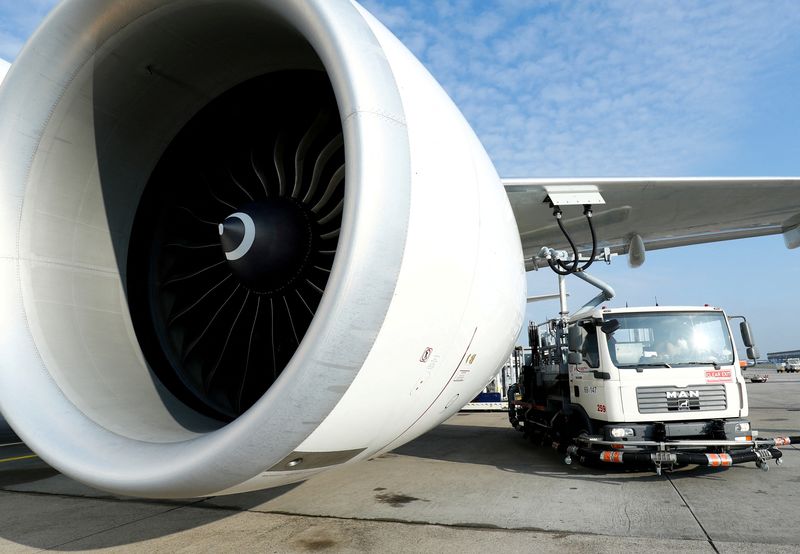By David Shepardson and Paul Sandle
FARNBOROUGH, England (Reuters) - Record temperatures at the Farnborough Airshow this week have ratcheted up pressure on global aviation to shrink airplane emissions and turn a raft of potential solutions - many of which are yet to be proven - into reality.
The airline industry, responsible for nearly 3% of global carbon dioxide emissions, faces formidable challenges to meet ambitious goals to cut emissions. Global airlines and aerospace manufacturers have vowed to be net zero by 2050.
The boss of planemaker Airbus said the heatwave was a strong reminder of the need for urgency.
"I consider there is urgency, speed is of the essence in the transition," Guillaume Faury told Reuters. "And in an industry that is hard to abate ... we need to be moving fast."
Pressure is coming from governments and customers, especially corporate travelers whose companies are looking to reduce carbon footprints.
"We have a basket of opportunities staring us in the face, where we just need to figure out which levers to pull in what timeframe with what economics to enable that transition," United Airlines Chief Sustainability Officer Lauren Riley said.
The United States and Europe are trying to boost production of sustainable aviation fuel, or SAF, which is now made in miniscule quantities from feedstocks like used cooking oil, and can be two to five times more expensive than standard jet fuel.
In the United States, Congress has to date failed to approve tax credits that would make SAF cost competitive.
"SAF is the only solution that allows you in the short term to have an impact because you can take an airplane you have operated for the last 10 years and turn it into operating now using SAF," said former Rolls-Royce (OTC:RYCEY) and Airbus executive Eric Schulz, Chief Executive of SHZ Consulting.
"So if you are talking about a short term solution, that's the only one."
Rolls-Royce says biofuels cannot not solve the problem alone.
"There's only so much used cooking oil you can synthesize," said the engine maker's Chief Technology Officer Grazia Vittadini.
"If you really don't want to start competing with agriculture, with the use of potable water, you need to go into synthetic fuel."
The problem is there is not much "green" hydrogen - produced using renewable energy - around to combine with captured carbon to make it, she said.
"The uptake of SAF is absolutely a bottleneck we need to work on collectively," she said.
Other short-term options include boosting the efficiency of engines, speeding up the replacement of older less efficient aircraft and improving the routing of airplanes to cut emissions.
International Air Transport Association Director General Willie Walsh said cutting carbon was not free. "There is going to be a cost to the transition to net zero," he said. That will inevitably mean higher air fares, industry leaders say.
LONG FLIGHT PATH
Companies are working on longer-term solutions like electric or hydrogen-powered airplanes, but critics say those are still a long way from reality.
"Hydrogen is absolutely a solution, but it's not for tomorrow morning because the changes to be done in design are so massive that it's going to take more than one generation of airplanes to get there," Schulz said.
Airbus and more than a half dozen airlines said at the show they had signed letters of intent to potentially buy carbon removal credits to offset the emissions from air travel from a planned direct air carbon capture and storage facility in Texas.
The technology has yet to be proven up to scale. And it's expensive, costing hundreds of dollars to capture just a ton of CO2. Several previous carbon capture and storage efforts have failed.
The United Nations' International Civil Aviation Organization (ICAO) is expected to try to reach agreement this year on new rules to cut emissions from international aviation.
Boeing (NYSE:BA) Commercial Airplanes Chief Executive Stan Deal said it was important new requirements were "underpinned by real technology that can meet the standards."
The prior ICAO standards were criticized by many environmentalists for doing little to cut emissions.
While pros and cons of competing technologies were debated, the need for progress appeared settled.

"The industry doesn't need any more signals," said Embraer Commercial Aviation CEO Arjan Meijer.
"You only have to walk around the air show here to see that sustainability is at the front of everyone's mind. And if you compare what you see today to what you saw three years ago, it's a massive shift."